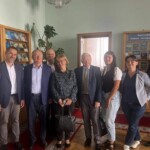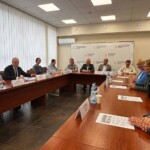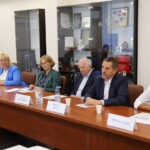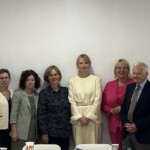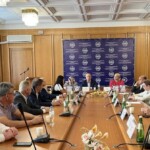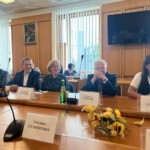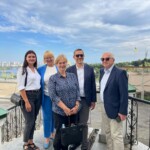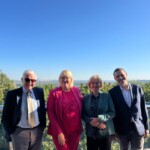Research visit to Kyiv

12 09 2025
On September 11–12, 2025, a study visit of Polish researchers took place in Kyiv. On the first day, three meetings were held.
The first meeting involved a discussion with two deputies of the Verkhovna Rada of Ukraine, Olena Shuliak (Chairperson of the Committee on State Power Organization, Local Self-Government, Regional Development, and Urban Planning) and Vadym Halaychuk (Deputy Chairperson of the Committee on Ukraine’s Integration with the European Union). The conversation covered, among other topics, the implementation of EU law into the national legal system, changes in legislative procedures to streamline this process, local government reform and effective decentralization, local government financing, and the division of powers among different levels of public authority.
An important topic was the internal resilience of the state in wartime conditions. Ukraine managed to maintain the continuity of state institutions following the beginning of russia’s full-scale aggression against the country in 2022. The parliamentarians emphasized that the Verkhovna Rada of Ukraine convened early on the morning of February 24, 2022, with a quorum sufficient to pass the necessary legislation. At the same time, the war forced certain limitations on citizens’ rights, particularly regarding access to information and transparency of government actions. Some of these restrictions are now being lifted, such as online broadcasting of parliamentary sessions.
The second meeting took place at the Kuras Institute of Political and Ethnic Studies of the National Academy of Sciences of Ukraine. Researchers working at the Institute participated in the meeting. Prof. Oleh Rafalski, Director of the Institute, presented its structure and research directions, emphasizing the involvement of researchers in applied studies aimed at improving state functioning. Dr. hab. Agnieszka Dudzińska, leading the project “The Impact of the Political System’s Structure on the Quality of the State Institutions’: Polish and Ukrainian Experiences and Perspectives”, introduced the research team and outlined the objectives and course of the project. The discussion included possibilities for applying international research and publication standards in further joint work.
In the afternoon, a meeting was held at the Ukrainian Crisis Media Center with its director, Valeriy Chaly, who presented the origin of the Center, established in 2014, and its ongoing projects. Of particular interest was a project targeting local government units (hromadas) aimed at supporting their development, which also led to spontaneous networking for joint activities. An important focus of the Center is functioning as a press hub for various civic organizations. The Center is also active in communication (including producing a podcast), combating disinformation, and cybersecurity.
On the second day, Polish researchers participated in a meeting with the leadership and staff of the National Agency on Corruption Prevention (NAZK). The meeting was led by the Agency’s Deputy Head, Serhiy Hupiak. He presented the structure of Ukraine’s anti-corruption administration and the tasks carried out by NAZK. He emphasized the link between corruption and the quality of legislation. He also discussed work on a new anti-corruption strategy for 2026–2030, being developed by more than 20 teams with the participation of external experts. The discussion covered both legislation and the process of shaping an anti-corruption culture, including educating young people about risks and monitoring conducted by the Agency.
The study visit also included sightseeing in Ukraine’s capital, including numerous memorials to heroes of the ongoing defensive war and earlier protests, which reinforced the country’s independence and the rule of law. Visits to the Kyiv Pechersk Lavra and St. Sophia’s Cathedral allowed the Polish researchers to learn about the historical roots of Ukrainian national identity and culture.
